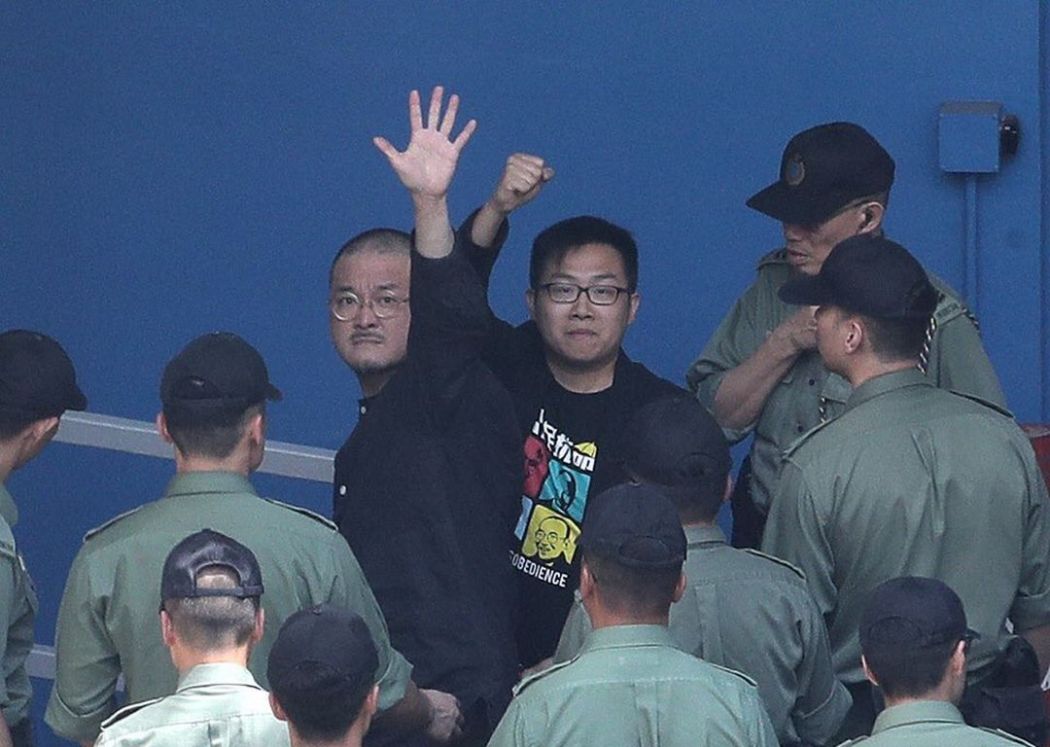Four Hong Kong activists have just spent their first night in prison, having previously been convicted of public nuisance charges related to the 2014 Umbrella Movement. Supporters have voiced concerns on whether the activists could cope with their new environment – but one veteran of the prison system has been passing on advice about life behind bars.
Law scholar Benny Tai and retired sociology professor Chan Kin-man have started serving their 16-month jail sentences, while activist Raphael Wong and lawmaker Shiu Ka-chun are each set to serve eight months.
Some of their lawyers have said an appeal was on the cards, but for now, prison life has become a daily reality for the four men.

Recent years have seen an increasing number of pro-democracy figures imprisoned in Hong Kong. Aside from Wednesday’s high-profile case, the jailing of young activists such as Joshua Wong in 2017 also sparked local and international attention.
In light of this, Raphael Wong penned the White Hand’s Guide – a 24-page booklet providing advice to the city’s pro-democracy activists on how to survive jail.
Wong has a decade-long history of activism with the League of Social Democrats, and ended up in prison twice. In 2017, he was sentenced to 13 months in jail over protests related to Northeast New Territories land development, and in 2018 he was given four and a half months behind bars for contempt of court.
However, the remaining three Umbrella Movement activists are “white hands” – Cantonese slang for people going to jail for the first time in their lives.
The White Hand’s Guide
HKFP has been permitted to cite passages from the privately-circulated document, which provides a glimpse into the activists’ preparations as well as Hong Kong’s prison culture.
“Today is a temporary farewell, but one day there will be a reunion,” the booklet begins. “Prison’s biggest punishment is the loss of liberty: not being able to communicate with friends and family, and leading a disciplined life. Undoubtedly it feels bad to part with your family, but before the temporary farewell, it is important for you to understand your rights so your family need not worry.”

Wong wrote the booklet based on his own experience and additional research. It was published by the Prisoners Rights Concern Group, and lists the contact details for Demosisto, the League of Social Democrats, as well as pro-democracy lawmakers Fernando Cheung and Au Nok-hin.
In a foreword, Wong wrote that problems still existed within Hong Kong’s correctional services, such as focusing on penalisation over rehabilitation, and the lack of effective complaint channels.
The booklet is divided into two sections, “before prison” and “after arrival,” and content is organised in a way similar to cram-school study notes.
Among the topics addressed are the rules governing letters, books, solitary confinement and visits. Wong often inserted Cantonese slang terms in parentheses: for example, a visit from friends and family is called “grave sweeping,” a wry reference to Ching Ming Festival.
It also offers a step-by-step guide on what happens at Lai Chi Kok Reception Centre – the sorting location for all of Hong Kong’s incoming prisoners. The four activists would stay there for at least the first night of their sentences.

On Wednesday evening, hundreds of supporters of the jailed Umbrella Movement activists held a candlelight gathering outside the centre.
“Once you arrive at Lai Chi Kok Reception Centre, please immediately look for the welfare officer to add the names of friends and family onto your visitors’ list,” the booklet says. “This way, they can contact you in prison as soon as possible, and send you supplies.”
The guide also urges readers to treat inmates “like normal people,” even if they had complicated backgrounds or criminal histories. Things usually turn out fine if there is mutual respect and communication, Wong wrote. He also tells readers how to identify and address different ranks of correctional officers, and what activities are available in jail.
Some light-hearted tips can also be found: for example, Wong said inmates don’t need to buy the Sing Tao Daily or South China Morning Post with their own money, since most prisons subscribe to them already.
‘Fight for happiness’
The booklet refrains from emotionally charged commentary, instead opting for legal facts and user-friendly hints. However, as is characteristic of Wong’s public speeches, the booklet ends on a defiantly optimistic note.

“I hope this guide can help you, your family and friends to get through these times, and I wish that you can start a new life in prison, pushing your limits, and fighting hard for the happiness of your family, friends and yourself!”
The four Umbrella Movement activists were transported to the Lai Chi Kok Reception Centre shortly after lunchtime on Wednesday.
As they were led off the prison van, Shiu waved to photographers while Tai smiled. Before he was led away, Wong shook his fist in the air.
The Hong Kong Free Press #PressForFreedom 2019 Funding Drive seeks to raise HK$1.2m to support our non-profit newsroom and dedicated team of multi-media, multi-lingual reporters. HKFP is backed by readers, run by journalists and is immune to political and commercial pressure. This year’s critical fundraiser will provide us with the essential funds to continue our work into next year.

